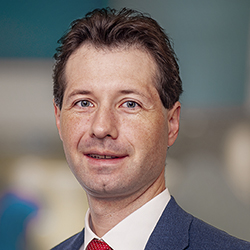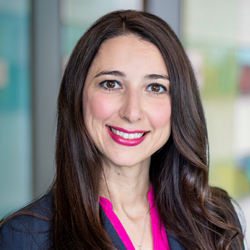Portal Hypertension Clinic
Contact the Portal Hypertension Clinic
What is the Portal Hypertension Clinic?
The Portal Hypertension Clinic brings together a team of experts to care for children and teens who have or are at risk for health problems, like bleeding, due to portal hypertension.
Ours is the only multidisciplinary clinic in the western United States for children with complications of portal hypertension. Here, experienced liver transplant surgeons, hepatologists, interventional radiologists and nurses use a range of treatment options to meet your child’s unique health needs.
What is portal hypertension?
Portal hypertension is high blood pressure in the portal vein, which brings blood from your child’s intestine to their liver. It happens when something blocks the flow of blood to or through the liver.
Blood flow may be blocked by:
- Problems in the portal vein, such as blood clots or narrowed places
- Diseases that harden the liver, which keep blood from moving through easily
By itself, portal hypertension does not always need treatment. But it can lead to other health problems that do require care.
Other Forms of High Blood Pressure
These Seattle Children’s programs and clinics focus on other forms of high blood pressure in children and teens:
- Pediatric Hypertension Program – high blood pressure throughout the body
- Pulmonary Hypertension Clinic – high blood pressure in the lungs
- Renovascular Hypertension Program – high blood pressure from narrowed arteries that carry blood to the kidneys
Services We Provide
-
Endoscopic banding
Endoscopic banding is a method to prevent or treat bleeding varices. A doctor passes an endoscope through your child’s mouth into your child’s esophagus to see varices and place rubber bands around them. This is also called endoscopic variceal ligation.
-
Sclerotherapy
Sclerotherapy is another way to prevent or treat bleeding varices. A doctor, guided by ultrasound, uses a needle to inject dye so they can see the blood vessel and inject medicine to shrink the blood vessel. We use sclerotherapy if a child’s esophagus is too small for the special tools needed for endoscopic banding.
-
Treatment for ascites
Diuretics may help reduce fluid if it builds up in your child’s belly. If these medicines aren’t enough, the doctor may use a needle or catheter to remove the fluid (paracentesis).
-
Shunt
A shunt is a small tube that drains fluid from the body or sends fluid in a new direction. If blood cannot travel easily through your child’s portal vein and liver, doctors may use a shunt to redirect some blood. This lowers pressure in the portal vein. Types of shunts we use include:
- Transjugular intrahepatic portosystemic shunt (TIPS) — The doctor makes a tunnel through your child’s liver to connect the portal vein to a vein that carries blood from the liver to the heart (hepatic vein).
- Distal splenorenal shunt — The surgeon detaches the vein for the spleen (splenic vein) from the portal vein. Then the surgeon connects the splenic vein to the vein of the left kidney.
- Mesocaval shunt — The surgeon detaches the vein for the small intestine (superior mesenteric vein, SMV) from the portal vein. Then they connect the SMV to the main vein that carries blood from the trunk and lower body to the heart (inferior vena cava).
- Portacaval shunt — The surgeon makes a bridge from the portal vein to the inferior vena cava.
- Meso-Rex shunt — The surgeon makes a bridge from the SMV to the liver. This may be an option if your child’s liver works well enough to receive the usual amount of blood but their portal vein is blocked.
-
Advanced treatment for liver disease through our Hepatology Program
Our Hepatology Program treats the whole range of liver diseases and will provide the most advanced care to manage any condition affecting your child’s liver.
-
Transition to our Liver Transplant Program
Many children with portal hypertension will never need a liver transplant, but some will. If your child does, the Portal Hypertension Clinic team will make your transition to the Liver Transplant Program as smooth and seamless as we can for your family. Seattle Children’s has the only liver transplant program for children in the Pacific Northwest and some of the best outcomes in the country.
Improving Treatment Options for Children
- Seattle Children’s is part of the Childhood Liver Disease Research Network (ChiLDReN), a national group of pediatric centers studying the best ways to treat portal hypertension and liver conditions.
- Our doctors are well known for their research to improve TIPS in children. They are also known for many other publications on the liver and related organs. These include textbooks on pediatric hepatology and solid organ transplant.
Scheduling an Appointment with the Portal Hypertension Clinic
- To make an appointment in the Portal Hypertension Clinic, call 206-987-1800.
- Learn how to schedule an appointment at Seattle Children’s.
- Learn about hepatology resources and liver transplant resources, such as useful links, videos and recommended reading for you and your family.
Telemedicine at Seattle Children’s
Your child’s first appointment in our clinic will be in person and take about 90 minutes. Later visits may be offered via telehealth (virtual). Learn more about telemedicine at Seattle Children’s.
Meet the Team
The clinic brings together Seattle Children’s doctors, surgeons, nurses and schedulers in 1 place to care for your child. Based on your child’s needs, we also involve other types of providers, including dietitians, pharmacists and social workers.
Members of the Portal Hypertension Clinic team have many decades of experience treating children with this condition and other conditions that affect the liver. We are experts in adapting the latest techniques from adult medicine and surgery to meet the needs of young people.
Providers in the clinic include:
Teams
Doctors and surgeons
-

Andre A S Dick, MD, MPH
Nurse coordinators
-
Megan Clift, RN, MSN, CPN, CNL
-
Danielle Moriates, RN, BSN
-
Rachel Page, RN, BSN, CCRN
Contact Us
Contact the Portal Hypertension Clinic at 206-987-1800 for an appointment, second opinion or more information.
Providers, see how to refer a patient.
Paying for Care
Learn about paying for care at Seattle Children’s, including insurance coverage, billing and financial assistance.








